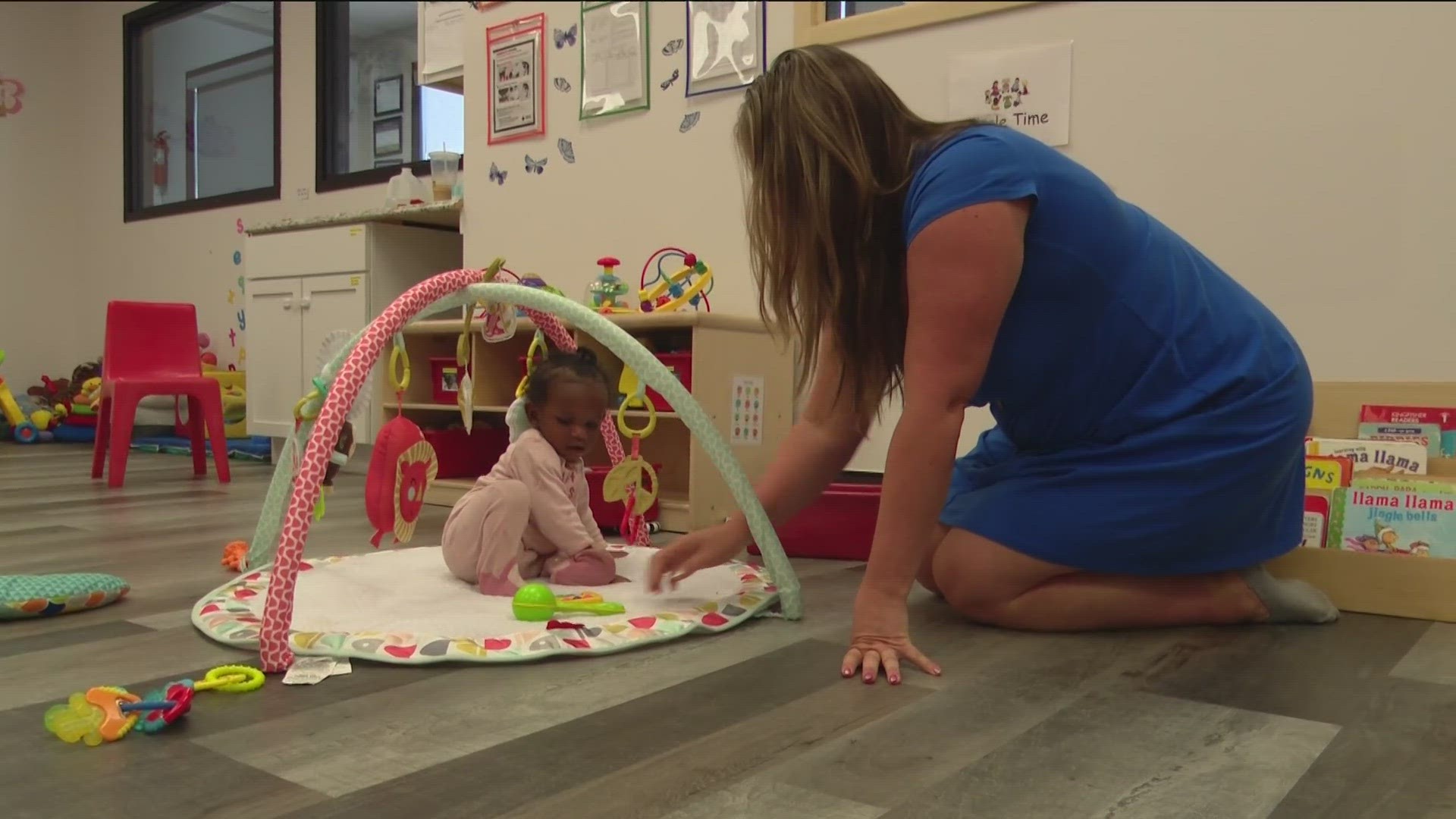ST PAUL, Minn. — State capitol Democrats are pressing to make childcare more affordable for middle-income families, proposing a scholarship program that would be open to almost 90% of Minnesota households.
While the state spends hundreds of millions of dollars each year subsidizing the cost of childcare for lower-income families, many parents earn just a little too much to qualify for childcare assistance, early learning preschool scholarships and Head Start.
"Infant care is expensive, costing around $17,000 a year and that’s more than a year of college tuition across the state of Minnesota," Rep. Carlie Kotyza-Witthuhn, an Eden Prairie Democrat, told reporters at a capitol news conference.
"We are asking young parents, often at the beginnings of their careers, at their lowest earnings potential, to shoulder this cost alone."
Rep. Kotyza-Witthuhn’s Great Start Affordability Act would lower childcare costs on a sliding scale basis for families earning up to 150% of the state median income. For a family of four, the state median income is $125,000, so 150% of that would be $188,000. The minimum grant would be $25 per month per child, and the maximum would be $600 per child.
"We plan to utilize existing payment infrastructure, which would allow us to get the program up and running more quickly and bringing help to Minnesota families faster and more efficiently."
The Minnesota Department of Human Services produced a statewide childcare cost modeling study in 2023 that revealed the cost of infant care, toddler care and preschools in each region of the state. The report concluded the current childcare cost structure isn't sustainable in Greater Minnesota, the area outside of the Twin Cities Metro area.
"I can tell you without a doubt that childcare is one of the top issues I hear about," said Sen. Grant Hauschild, a Hermantown Democrat. "Not just from families, but I hear it from businesses, I hear about it from community leaders, I hear about it from prospective businesses that want to open up shop."
Sen. Hauschild, who is the lead author of the Senate version of the bill, said he hopes childcare providers will add more capacity once they can see a reliable stream of scholarship payments.
"One of the beauties of this plan is that the payments go directly to the childcare providers, so it really provides stabilization for the childcare industry, helps them open up shop in some of those rural settings."
The Capitol news conference featured speakers from two-income households that still struggle to pay the cost of childcare.
"We had hoped to have a second child by now, because we wanted kids close in age," Alaina Skoglund told reporters. "Without hesitation, I can say the number one reason Harvey is still an only child is the cost of childcare."
Alexandria Packard said she works full-time for Fairview Health and her husband works full-time for Canadian Pacific Railroad, but she recently pulled her young daughter out of childcare because it would've cost $12,000 for three days a week.
"I had take her out because we could not afford to pay $500 every two weeks for part-time care," Packard said. "I’m 32 years old and my grandmother is caring for her great-grandchildren because we cannot afford childcare."
Legislative staff researchers haven't determined the total cost of the program to taxpayers. And there's less of an appetite for new spending because of uncertainty over the long-range budget outlook.
But supporters say the program is designed to be scalable. So, in theory, the grants could start out with more modest amounts and then grow larger as the state's fiscal outlook improves.
During a Senate Committee meeting this week, Lakeville Republican Zack Duckworth said he fully appreciates the dilemma parents face trying to find affordable childcare. At the same time, however, he said lawmakers will need to know the price tag.
Sen. Liz Bolden, a Rochester Democrat, said legislators should also recognize the cost to the state's economy of people going without childcare or putting off having children because of the high costs.
The childcare industry across the nation and in Minnesota has been slammed with rising costs and staffing shortages. Some of that is due to burned-out employees who can't afford to stay in their chosen profession.
Hauschild said a store clerk recognized his son because she works at his childcare center. It turned out she was working three jobs in total.
WATCH MORE ON KARE 11+
Download the free KARE 11+ app for Roku, Fire TV, Apple TV and other smart TV platforms to watch more from KARE 11 anytime! The KARE 11+ app includes live streams of all of KARE 11's newscasts. You'll also find on-demand replays of newscasts; the latest from KARE 11 Investigates, Breaking the News and the Land of 10,000 Stories; exclusive programs like Verify and HeartThreads; and Minnesota sports talk from our partners at Locked On Minnesota.
- Add KARE 11+ on Roku here or by searching for KARE 11 in the Roku Channel Store.
- Add KARE 11+ on Fire TV here or by searching for KARE 11 in the Amazon App Store.
- Learn more about the KARE 11+ app for Apple TV in the Apple App Store.
- Learn more about KARE 11+ here.
Watch more local news:
Watch the latest local news from the Twin Cities and across Minnesota in our YouTube playlist:

